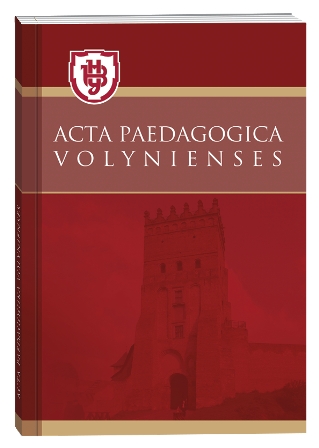ISSUES OF INCLUSIVE EDUCATION IMPLEMENTATION IN CHILDREN WITH SPECIAL EDUCATIONAL NEEDS IN UKRAINE
DOI:
https://doi.org/10.32782/apv/2021.5.23Keywords:
inclusive education, special education, categories (types) of learning difficulties, educational services, actual development level and area of child's closest development levelAbstract
This paper examines issues of organizational and methodological support of inclusive education in children with special educational needs (SEN). Approach of inclusive education is being actively implemented in Ukraine. Based on the analysis and generalization of research and publications, the article establishes imperfections in today's inclusive education system in Ukraine, caused mainly by economic, organizational and methodological factors, as well as difficulties in extrapolation and adapting of foreign experience in local conditions. In this regard, the paper aims to analyze the state of organizational and methodological support of inclusive education in Ukraine and make suggestions for its optimization. Assessing worldwide experience of inclusive education presented in works of domestic researchers, this paper considers today’s status of inclusive education a compromise between integration and differentiation, due to the unresolved main task which is to meet different educational needs of children in inclusive classrooms. Therefore, in provision of educational services to children with SEN, inclusive education relies on experience of differentiated learning. Adoption of inclusive education practice is at the same time an adoption of overall experience in teaching children with SEN. Article substantiates advantages of domestic experience in teaching and development of children with SEN, the experience based on methodological principles of cultural and historical theory of mental development; in particular, the concepts of actual development level and area of child's closest development level, the concepts that are considered crucial to adhere to while applying foreign experience. Assistance provided in Ukraine to children with different types of learning difficulties within the system of inclusive education is assessed as insufficient. Effectiveness of inclusive education for children whose intellectual development is close to norms, as well relevance of correctional and pedagogical assistance to children of early and preschool age who require it, are addressed. Present work also argues for expediency of combining special and inclusive classes as integral system in secondary schools since such system can flexibly respond to children’s learning needs. Further study on efficiency of various forms of education for children with SEN is emphasized and outlined as a subject for special research in near future.
References
Выготский Л.С. Собрание cочинений : в 6 т. / гл. ред. А.В. Запорожец. Москва : Педагогика, 1982–1984. Т. 5 : Основы дефектологии / под. ред. Т.А. Власовой. 1983. 369с. С. 257–321. URL: http://elib.gnpbu.ru/text/vygotsky_ss-v-6tt_t5_1983/ (дата звернення: 14.10.2021).
Выготский Л.С. Умственное развитие детей в процессе обучения: Сборник статей. М.-Л. : Государственное учебно-педагогическое издательство, 1935. 136 с. URL: http://psychlib.ru/inc/absid.php?absid=9980 (дата звернення: 14.10.2021).
Заярнюк О.В. Інклюзивна освіта в Україні: проблем и та шляхи їх вирішення. Науковий вісник Міжнародного гуманітарного університету. Серія: Економіка і менеджмент. 2015. Вип. 11. С. 190–193.
Колупаєва А.А. Інклюзивна освіта: реалії та перспективи : монографія. Київ : «Самміт-Книга», 2009. 272 с. : іл. (Серія «Інклюзивна освіта»).
Малофеев Н.Н., Шматко Н.Д. Базовые модели интегрированного обучения. Дефектология. 2008. № 1. С. 71–78.
Назарова Н. Интегрированное (инклюзивное) образование: генезис и проблемы внедрения. Социальная педагогіка. 2010. № 1. С. 77–87.
Організаційно-методичні засади діяльності інклюзивно-ресурсних центрів: навчально-методичний посібник / За заг. ред. М.А. Порошенко та ін. Київ : 2018. 252 с. URL: https://mon.gov.ua/storage/app/media/inkluzyvnenavchannya/posibniki/Inclusive_study_Sep17.pdf (дата звернення: 14.10.2021).
Положення про інклюзивно-ресурсний центр : Постанова Кабінету Міністрів України від 12 липня 2017 р. № 545 https://zakon.rada.gov.ua/laws/show/545-2017-%D0%BF#Text (дата звернення: 14.10.2021).
Продіус О.І. Особливості моделей інклюзивної освіти в країнах Європи відповідно до вимог сучасного суспільства. Проблеми системного підходу в економіці. 2019. Вип. 4 (72). С. 86–93.
Садова І.І. Інклюзивна освіта в країнах Європи. Педагогіка формування творчої особистості у вищій і загальноосвітній школах. 2020. № 69. Т. 1. С. 188–192.
Снісаренко О.І. Диференціація як система навчання інтегрованих учнів в загальноосвітньому закладі. Науковий часопис Національного педагогічного університету імені М.П.Драгоманова. Серія 19 : Корекційна педагогіка та спеціальна психологія. 2017. Вип. 33. С. 74–82.
Снісаренко О.І. Стратегія диференціації навчання інклюзивних учнів із затримкою психічного розвитку в умовах загальноосвітнього закладу. Актуальні питання корекційної освіти. 2017. Вип. 10. С. 327–341.
Софій Н.З. Особливості викладання в інклюзивному навчальному середовищі: практика спільного викладання. Освіта осіб з особливими потребами: шляхи розбудови. 2015. Вип. 10. С. 173–177.
Таранченко О.М., Найда Ю.М. Диференційоване викладання в інклюзивному класі: навчально-методичний посібник / за заг. ред. Колупаєвої А.А. Київ : «А.С.К.», 2012. 124 с.







